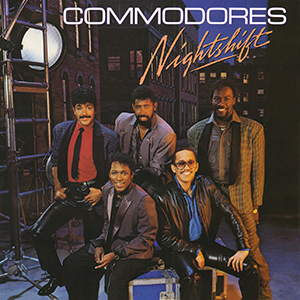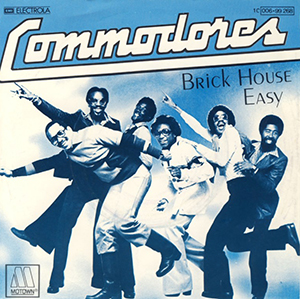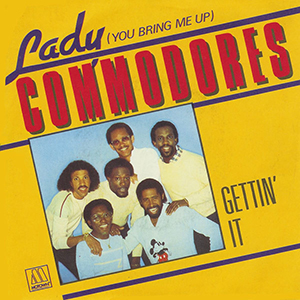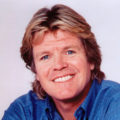Commodores keep working the “Nightshift,” promise Genesee “Brick House” and ballads
 Photo provided by Denise Truscello
Photo provided by Denise Truscello
Motown birthed what seems like a million monumental acts, but right toward the very top of their iconic roster for over half a century is certainly the Commodores.
The band’s ballad bonanza includes “Easy,” “Still,” “Sail On,” “Three Times A Lady” and “Just To Be Close To You,” while the guys could just as easily funk it up with the instrumental “Machine Gun” or the ubiquitous “Brick House.”
Even latter day grooves, such as “Lady (You Bring Me Up)” and “Nightshift,” retain the essence and endurance of the Vocal Group Hall Of Famers, who are sure to bring them all to the Genesee Theatre on Thursday, February 16.
Chicago Concert Reviews reached out to co-founder William King for a glimpse into his unpredictable songwriting process, the group’s relationship with the legendary label, bouncing back after fellow superstar Lionel Richie left the line-up and gradually introducing the next generation of Commodores.
What’s in store for the upcoming Genesee Theatre show?
 King: We find it very difficult to do anything other than our hit songs because that’s what the people want to hear. Many times we try to change a lot of things in the show by introducing other artists’ songs, but people just always want to hear “Three Times A Lady,” “Still,” “Lady (You Bring Me Up),” “Brick House,” “Nightshift,” “Sweet Love,” you know what I mean? And we don’t have enough time to perform all the songs that we’ve had hit songs with, so people sometimes get a little distributed, or angry, or whatever because we haven’t done a particular song they wanted, but we’ll run out of time. We generally try to perform the songs with a lot of high energy, a lot of singing, a lot of personal feel and enjoyment to the audience every night.
King: We find it very difficult to do anything other than our hit songs because that’s what the people want to hear. Many times we try to change a lot of things in the show by introducing other artists’ songs, but people just always want to hear “Three Times A Lady,” “Still,” “Lady (You Bring Me Up),” “Brick House,” “Nightshift,” “Sweet Love,” you know what I mean? And we don’t have enough time to perform all the songs that we’ve had hit songs with, so people sometimes get a little distributed, or angry, or whatever because we haven’t done a particular song they wanted, but we’ll run out of time. We generally try to perform the songs with a lot of high energy, a lot of singing, a lot of personal feel and enjoyment to the audience every night.
Do you have any previous memories of performing around the Chicago area?
King: I really don’t because we haven’t been here as many times as we would have liked to. Some areas we perform in a lot more, mainly around the West and East Coast, and also the South because that’s where we originated; Alabama, Georgia, Mississippi, New Orleans, all up in that area. But I have friends in the Chicago area that give me a very hard time about the fact that we’re not here more than once or twice a year (laughs).
The Commodores have been active for more than five decades at this point. What keeps you going after all of these years?
King: My mortgage (laughs). I don’t know what I would do if I wasn’t doing this. It had to be the love of it, the love of the music, the love of being on stage, the camaraderie of the guys. Most of the guys have been with me, and I’m talking not only the Commodores as the band, The Mean Machine we call them, but also our crew. We have crew members that have been with us over 30 years. It’s just a family affair. I’ve often thought about retiring, I really have, but the guys are always talking to me. “We got another 30 or 40 years, so let’s just keep it going.” And I have to admit, I love it. I truly do love it. The traveling has gotten to be very tiring cause we generally leave from the hotel between 2 and 4 or 5AM every morning. We have to be at the airport so we can get to the next show because there’s usually a show the next day. It makes it very difficult sometimes to feel good during the middle of the day, but I gotta tell you, when it comes time to go on that stage, man, it would take an army to hold me back! I feel energized. I feel vibrant. I feel like I want to do those songs. I feel like people are waiting. My feet and hips are moving. I’m telling you, the feeling you get before you go on stage is unbelievable.
You’ve been there since the very first day. What perspective has that brought you?

Photo by Andy Argyrakis
There are so many classic slow jams by the band it’s impossible to count them all. What’s the secret to writing a great ballad?
King: You know, actually, the one who writes the best ballads was Richie, right? I think he took out the inner being inside of you, cause the hit songs that I’ve written, they kind of come from nowhere, but definitely come from somewhere. But you don’t always know what that is in the very beginning because you’re just running with it. You get this idea in your head, a feeling. Sometimes I’m driving in the car, or I’m in bed, or I’m walking down the street, or whatever.
I’ll give you an example. One day I was in a jam packed elevator. There were mostly guys in the elevator. The elevator opened up on one of the floors and there was this really attractive girl standing there and there was no room for her, but those guys squeezed back so she could get in the elevator. There was this older gentlemen, probably in his 80s, and he had a cane. He was right behind me and he could barely look over my shoulder. He kept pushing and pushing trying to see this girl. I turned around to him and said, “dude, slow down a little bit. I mean young girls are your weakness.” And as I was getting off that elevator I thought hmmm, “young girls are my weakness. I just like the sweetness” and the melody started coming in my head [for what became “Young Girls Are My Weakness”]. That’s kind of like what happens and you don’t really know why that happens. People always ask, “does the music come first or the lyrics come first?” You know what? It just depends. I get lyrics. I get music. I can actually hear the horns, the violins a lot of times in my head. When I get a song, I can already hear it. I think it’s kind of like something you have to have in your being and people either have it or they don’t. Can you learn how to have it? I don’t know, but I’ve always had it. If I’m walking down the street, it’s just pounding in my head.
 I can remember twice in my life that it stopped. That humming, that beating, that murmuring in my head stopped and it was kind of like somebody had turned off a faucet or a waterfall. It just stopped and it was the weirdest feeling. I so badly wanted it back, but I didn’t know how to get it back. There was just this loneliness inside of my being and I kept wondering, “oh my God. I don’t hear anything in my head anymore.” And then one day, it came back. Now I don’t know what stopped it. I don’t even know what made it come back, but it did. It’s hard to explain it sometimes because I don’t know how to explain it (laughs), but I can kind of give you an idea of what it feels like. It’s like something’s always going on inside of you. It’s always in your head, and if it stops, it’s like if someone is beating a pan and all of a sudden someone stops beating it, you’d recognize it right away. I didn’t know how to get somebody to start beating the pan again (laughs), but it came back. And it’s happened to me twice in my life. I don’t like it when it stops.
I can remember twice in my life that it stopped. That humming, that beating, that murmuring in my head stopped and it was kind of like somebody had turned off a faucet or a waterfall. It just stopped and it was the weirdest feeling. I so badly wanted it back, but I didn’t know how to get it back. There was just this loneliness inside of my being and I kept wondering, “oh my God. I don’t hear anything in my head anymore.” And then one day, it came back. Now I don’t know what stopped it. I don’t even know what made it come back, but it did. It’s hard to explain it sometimes because I don’t know how to explain it (laughs), but I can kind of give you an idea of what it feels like. It’s like something’s always going on inside of you. It’s always in your head, and if it stops, it’s like if someone is beating a pan and all of a sudden someone stops beating it, you’d recognize it right away. I didn’t know how to get somebody to start beating the pan again (laughs), but it came back. And it’s happened to me twice in my life. I don’t like it when it stops.
On the funky side, why do you think “Brick House” stood the test of time?
King: I think one thing about that song is, first of all, it’s very melodic and it’s got a groove to it that you can’t stop. If you were sitting down in a room somewhere and that song came on, you just automatically start moving. Some music or a song can come on and you hear it, but you don’t really have a bodily reaction. But when “Brick House” comes on, not only do people have a bodily reaction, but they jump up (laughs) and start dancing, so I think that’s why that song has been so successful. Nobody knows the formula for hit songs, even though sometimes people write a lot of them. Eventually it kind of fades through the years, but sometimes you just have it. We always said, “you have your finger on the pulse of the world.” You know exactly what they want to hear at that particular time, so it’s having that and having a great feel for rhythm because funk is about rhythm. It’s a very distinctive rhythm, which is why there’s a name for it because we can actually regiment it into an order of beats in a measure.
But having said that, there’s another outside force that comes in that regulates those beats that we don’t know anything about. We just luckily happen up on it, I guess, because if we all knew what they were, everybody would have a hit song doing it, right? We do know the format of the beats, which is why we have name for it and we can categorize it, but we don’t have the true order or the feel of the beat of how to get it there every time. That’s the mystery and that’s what keeps us all working so hard. It keeps us having the arguments. “This bass pattern is better than this bass pattern.” The enjoyment in it for me is trying to figure it out, and I’ll tell you, the Commodores had so many arguments about what’s the right pattern or what’s not the right pattern, what sucks, what doesn’t suck (laughs). So it’s a lot of work, it’s takes a lot of practice, it takes a lot of time to get a lot of things done, but I tell you, some songs just come out of nowhere and you can do them in 10, or 15, or 20 minutes. Some songs you have to labor at to finally get it right. Nobody knows the answer and I hope it stays that way because it is a lot more fun and it spreads the hits around instead of one person doing it all the time. So it’s a life of enjoyment, it’s a life of experience, it’s a life of trial and error, and I wouldn’t trade it for anything.
 You personally wrote one of the group’s most colossal tracks, “Lady (You Bring Me Up).” What do you recall about that process?
You personally wrote one of the group’s most colossal tracks, “Lady (You Bring Me Up).” What do you recall about that process?
King: I was trying to come with an up-tempo hit song. We had had so many ballads and we wanted more up-tempo songs in the show that actually belonged to the Commodores so we wouldn’t have to play anybody else’s songs. That’s what influenced me to try to come up with a song like that, and luckily, we did. It was a song we labeled “Mover,” the actual rhythm itself. The rhythm came pretty easy, but it was the lyrics [that took a long time]. My ex at the time came out to the house and we were doing the song. I came out to the pool house and she said, “why is it taking you guys so long? You’re laboring so hard over this thing.” We told her we were working on this like that and she said, “oh, well, try it again.” We played it and she said, “how about ‘lady, you bring me up when I’m down.’” I mean just like that, boom! And we said, “oh yeah, that will work” (laughs). During that divorce, I paid dearly for that (laughs), but it was absolutely worth it.
What was it like reinventing yourself during the “Night Shift” era and beyond?
King: Oh yeah, that was the most difficult time for us because Richie had left the group in ‘82, so we were still trying to bounce back from that. A lot of people, including our record company, Motown at the time, really had just given up on us. Since Richie was gone, that was it. As a person, as a human being, when somebody thinks that you are worthless, then that really pisses you off in a way. We knew we had to come up with a hit album, so that was the trial that we put into that particular album. I am so glad that we were able to come up with that song because that song pumped new life into the Commodores…Richie was the lead singer at that time mostly. It’s so funny because Walter [Orange], the guy who actually did [the lead singing on] “Brick House,” is and was an incredible vocalist, so we felt we’d just continue on with that. Richie had a lot of fame at the time, not only with us, but with Kenny Rogers and Diana Ross, so it leaned more toward him and I get that, but there came a point where we had to prove ourselves. “Nightshift” did that for us and that was the beginning of the second part of the Commodores.
How would you describe your partnership with Motown prior to that point?
King: Our partnership with them started off wonderful, as most partnerships do, and they were great. I mean [founder] Berry Gordy was great. Suzanna de Passe was actually the one who got us signed. As a matter of fact, when she actually found us, she was a very young girl, basically, that had just signed with Motown herself in the A&R department. When we first got to Motown, they wanted us to basically prove ourselves, so we went out with The Jackson 5 first before they signed us. We were the opening act for The Jackson 5 and that really helped us because we were getting great reviews as their opening act and we were being seen by 20,000 or 25,000 [people] every night for a hundred and some dates. Our name was all over the United States. We toured with them for two-and-a-half years, and after that, Motown signed us.
 But they did not want us to do our own original material. They wanted us to do songs that they had already cut. They had already made the music tracks, but [there were] no vocals on them and they wanted us to sing over those cause they had already spent money on those, so they were saving money by putting us over the top of them. These tracks had been cut for Marvin Gaye, Stevie Wonder, Four Tops, The Temptations, all the old acts, and the bottom line was that we were all trying to sing over the top of tracks that were not cut especially for us. So it made it real hard for us to sing on those tracks, cause first of all, our hearts were not in it. You would think it would be cause it was the beginning for us, but we really wanted to do our own material. It wasn’t until Milan Williams had an instrumental track called “Machine Gun” that Berry Gordy heard that he liked. He put that song out and that song took off like a lightning rod, first in Asia, then in Europe and then it came back to the United States. It was a smash hit for us. It was a disco song, no vocal, and it established us. Then from there, we began to put songs out that had vocals on them, so that was the beginning for us. I can look back on it now and tell you how it all happened, but at the time, man, it looked like it was never gonna happen.
But they did not want us to do our own original material. They wanted us to do songs that they had already cut. They had already made the music tracks, but [there were] no vocals on them and they wanted us to sing over those cause they had already spent money on those, so they were saving money by putting us over the top of them. These tracks had been cut for Marvin Gaye, Stevie Wonder, Four Tops, The Temptations, all the old acts, and the bottom line was that we were all trying to sing over the top of tracks that were not cut especially for us. So it made it real hard for us to sing on those tracks, cause first of all, our hearts were not in it. You would think it would be cause it was the beginning for us, but we really wanted to do our own material. It wasn’t until Milan Williams had an instrumental track called “Machine Gun” that Berry Gordy heard that he liked. He put that song out and that song took off like a lightning rod, first in Asia, then in Europe and then it came back to the United States. It was a smash hit for us. It was a disco song, no vocal, and it established us. Then from there, we began to put songs out that had vocals on them, so that was the beginning for us. I can look back on it now and tell you how it all happened, but at the time, man, it looked like it was never gonna happen.
Do you ever foresee new music from the Commodores?
King: Actually, we’re in the studio right now cutting some tracks. I’m personally cutting sort of a smooth jazz album right now. I’m a trumpet player, so I’m doing that. And now we have two Commodore babies (laughs) in the group, working with us and performing on stage. These two young men are the sons of Walter Orange, and hopefully soon, we’ll have two more of our children that come from the Commodore family coming into the group. One is a girl and we’re looking forward to that. That’s what we’re doing now. We’re intermingling all of this as we speak. If you come to the show in Illinois, you will see two of them and you will see how wonderful they are on stage. We’ve let them take lead on a lot of stuff because the idea is we call them G2, the Commodores second generation. Eventually we will step out, the original group, and they’ll take over. They can take this a lot further down the road. The idea now is to do an album with them on it so they can be introduced to the world. They’re being introduced every night we do this show to the audience of the Commodores and to the [concert booking] buyers. If you come out, you will see these young men are incredible. In my mind, they are Commodores now.
How do you hope the group will be remembered?
King: I hope that the Commodores are remembered as being an incredible music group and incredible human beings, and that everybody who met them, even though they may have had discrepancies (laughs), they can still look back and say, “but those were great human beings.” That’s how I want all the Commodores to be remembered.
Commodores perform at the Genesee Theatre on Thursday, February 16. For additional details, visit CommodoresLive.com and GeneseeTheatre.com.








